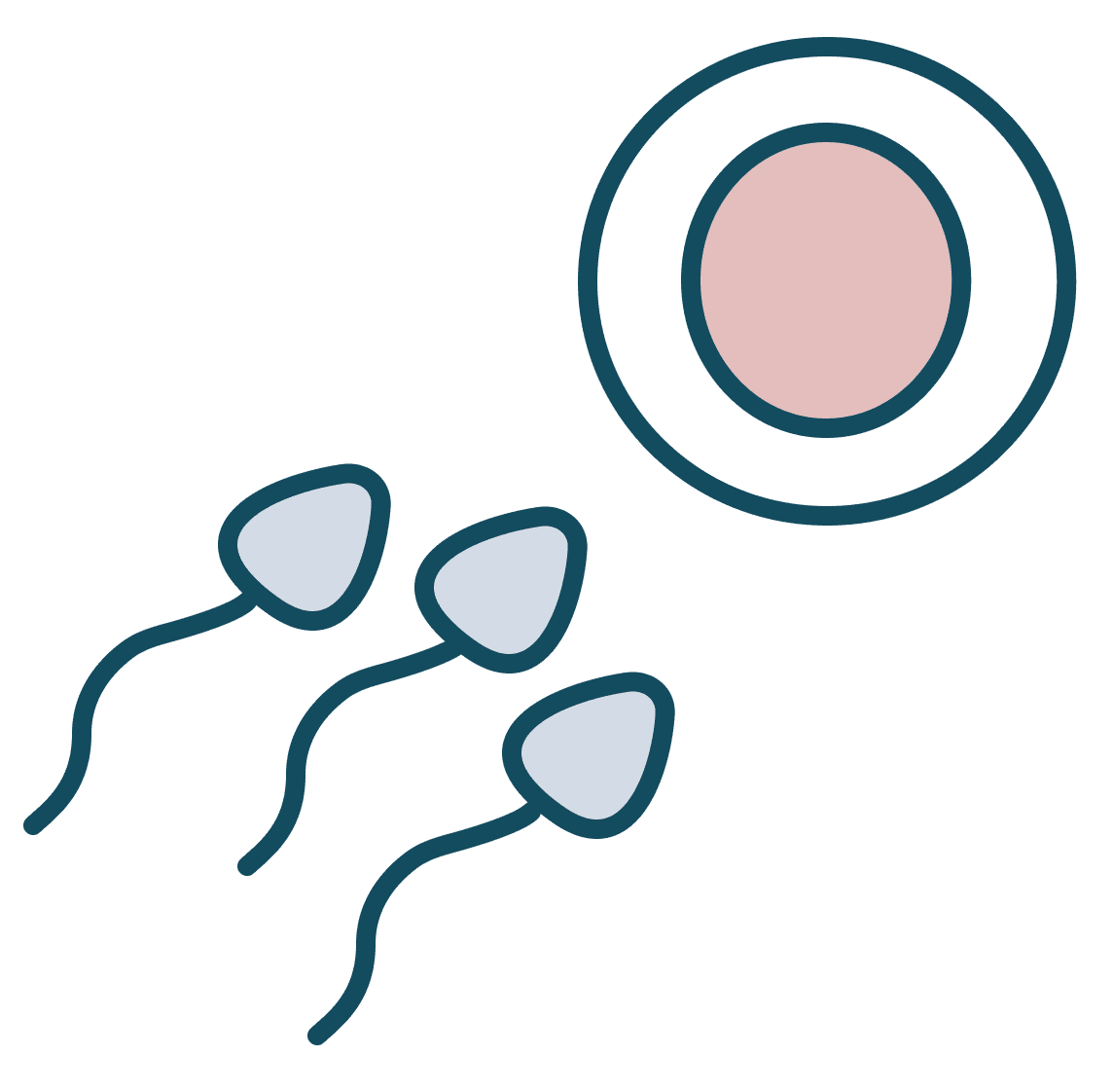PCOS and fertility: everything you need to know
Words by
Dr Georgina Leslie, Clinical Lead at Bloomful
Updated on
15 Feb 2023
Finding answers to fertility questions can be difficult enough on its own, let alone when you have a complex condition such as PCOS. In this piece, we’ll help you understand how PCOS and fertility are linked and explain the treatment options in detail.
You’ll notice a fair amount of medical information; that’s because we want you to feel informed and empowered to continue the conversation with your doctor.
What is PCOS?
Polycystic ovary syndrome (PCOS) is caused by a hormone imbalance that impacts the ovaries. Your ovaries contain follicles in which eggs develop. In PCOS, eggs don’t always develop or get released, which can lead to missed or irregular periods.
Globally, between 4–20% of women have PCOS. It can show up at any age after puberty, although most women discover they have PCOS in their 20s and 30s, after experiencing difficulty falling pregnant.
Aside from its impact on fertility, leaving the condition untreated can lead to symptoms worsening with time. PCOS is also associated with an increased risk of type 2 diabetes and high cholesterol levels developing later in life, which can have an impact on your heart and other organs in the long-run.
How does PCOS affect fertility?
One of the main features of PCOS is ovulation disorders. A woman with PCOS can experience infrequent ovulation (oligoovulation) or no ovulation at all (anovulation). In fact, PCOS accounts for approximately 80–90% of cases of anovulatory infertility.
If ovulation doesn’t occur often, your opportunities to conceive may be limited. Detecting ovulation can also be tricky as it’s hard to know when you’re in your fertile window (many women struggle to get a definitive answer even with at-home ovulation tests).
What are my chances of conceiving if I have PCOS?
It’s important to remember that fertility is complex. Even women who ovulate like clockwork can have difficulty conceiving. It’s also not just a ‘woman’s issue’; in two-thirds of infertile couples male factors are at play.
Although it’s difficult to give statistics as cases vary so much and different treatments have different success rates, most women with PCOS will be able to have a baby through fertility treatment. For women who are under 35, this is even more the case.
How can I know if PCOS is affecting my fertility?
If you’ve been diagnosed with PCOS and aren’t menstruating regularly (regular = bleeding every 21-35 days), then you are more likely to have an ovulatory disorder. If you know you have PCOS and have unsuccessfully been trying to conceive for six months by having regular sex every 2-3 days (yes, a lot of sex!) then it’s time to speak to a GP, gynaecologist or fertility specialist.
Can PCOS also affect pregnancy?
While it’s possible to have a normal pregnancy with PCOS, the condition does increase your chance of complications, including miscarriage and stillbirth.
What follows is a list of possible complications that could arise; it sounds alarming, but there are many treatment options that can decrease your risks (we’ll go on to explain these further down).
Preterm birth is defined as birth between 24 and 37 weeks of pregnancy. The earlier a baby is born, the greater the chance it will need intensive care admission. Preterm birth can also result in breathing, feeding and learning difficulties and developmental delay. It can also lead to the loss of a newborn.
Reduced embryo implantation rate is where there’s an increased chance that a woman’s embryo fails to implant and develop into a pregnancy.
Ectopic pregnancy is the development of a pregnancy outside the uterus. This kind of pregnancy can’t survive and can cause severe blood loss in the mother, in some cases requiring surgery.
Pre-eclampsia is a high blood pressure condition that occurs in pregnancy. In severe cases it can affect all organs in your body as well as the baby’s growth. Pre-eclampsia is associated with preterm birth and stillbirth.
Ovarian hyper stimulation syndrome (OHSS) is a condition in which the ovaries become large and excess fluid collects in the abdomen (resulting in pain and vomiting), and on the lungs (resulting in breathing difficulty). This can require hospital admission for supportive therapy.
Gestational diabetes (GDM) is a condition that occurs when your body is unable to make enough insulin during your pregnancy, which in turn affects how your body manages glucose. This can have a detrimental effect on your long-term health, but can also impact the baby. It can cause preterm birth and breathing difficulty and can affect the baby’s ability to control its own blood sugars when born (it can also develop diabetes later in life). GDM can also increase the chances of the baby being larger, which can cause delivery complications that can require a caesarean.
Optimising your health is absolutely key before trying to conceive. Not only will it improve your chances of conception, but it will also reduce your risk of miscarriage and pregnancy complications.
When you meet your midwife for the first time, it’s important to make them aware of your PCOS as you might need extra monitoring for the above conditions. They can also help you find ways to stay healthy during pregnancy and offer extra care tailored to your circumstances.

What treatments are available to help me conceive?
Before we get into treatments, it’s important to note that these aren’t quick fixes. The most important action you can take to improve your chances of natural conception, fertility treatment success and reduced pregnancy complication is to address what we call lifestyle factors:
Aiming for a healthy body mass index (BMI)
It’s hard to talk about weight; we know it can often feel like doctors constantly point the finger at it as the cause of the problem. While that often doesn’t feel helpful, it is meant with good intentions.
Guidance from the British Fertility Society suggests that treatment should be deferred until your BMI is less than 35 kg/m2. A moderate weight loss of 5–10% of body weight can be enough to restore fertility and improve metabolic parameters.
It can be particularly helpful to get guidance from a nutritionist as we’re all individuals with different routines, stress factors and habits. There is just as much of a mental component to lifestyle change as there is a physical one. There is also a lot of dietary advice that comes with pregnancy, so you can think of this as your pre-pregnancy prep.
Don’t forget to involve your doctor as help may be at hand with metformin (see below) or other weight loss strategies.
Exercise
In addition to helping you reach/maintain a healthy BMI, exercise is also great for reducing stress, which can have a negative impact on your hormones and consequently your menstrual cycle. It’s recommended to increase your physical activity by 5% each week until you’re getting between 2.5-4 hours of exercise per week. Of course, this doesn’t mean you need to be stuck in the gym for hours; find a mix of physical activities that work for you, and if you can combine aerobic and strength training even better!
Emotional and mental wellbeing
Women with PCOS are more likely to be affected by anxiety, low self-esteem and depressive symptoms. Add to that the pressure of trying to conceive and things get even more challenging.
Being aware of your emotional and mental health is important as is reaching out for help if you’re feeling overwhelmed. It’s well recognised that fertility journeys can also put strains on our relationships. Being open and honest with your partner is crucial. Try to cut down on work or commitments that aren’t an immediate priority and schedule time for relaxation and calm, especially around the time of ovulation. Anecdotally, you’ll always hear the story of ‘so and so’ who got pregnant when they stopped trying. While it can be frustrating to hear, there is logic to it since stress hormones can impact our menstrual cycle and as a result can interfere with our ability to conceive.
Folic acid supplementation
Folic acid is a vitamin that helps with cell metabolism and new cell formation. During early development, it helps form the neural tube in the foetus (which goes on to develop into the brain and spinal cord). A deficiency in folic acid can lead to lifelong birth defects in the baby’s brain or spine. If you have a higher BMI, you may need a higher dose of 5mg folic acid supplementation to prevent against these defects. This is something you can bring up with your doctor.
Semen analysis
If you have a male partner, it’s important for them to get checked and rule out any issues with sperm count and motility. If there is an issue, it may be more appropriate to consider IVF rather than ovulation induction therapies (more on these below). Optimising your partner’s health will also improve sperm health (think cutting out smoking, drugs and alcohol, and opting for exercise and a balanced diet).
Tubal patency tests
If you’re thinking about treatments to improve ovulation (other than IVF) then it’s wise to have a tubal patency test first. Some therapies can be expensive, so let’s be cost-effective here and get your fallopian tubes checked first. This assessment can see whether, once you’re ovulating, the sperm and egg are able to meet to form an embryo.
To check everything is working, fluid is gently inserted through the cervix and into the uterus and tubes. Patency is confirmed when we can see the fluid pass through and out of the tubes, either by ultrasound or during a laparoscopy. Conditions affecting tubes include previous pelvic surgery or infection, endometriosis and previous ectopic pregnancy, but blockages can also occur without cause.
Medical treatments
Ovulation induction therapies
This is where medication is used to stimulate the ovaries so that they can produce egg-containing follicles. Due to possible side effects (hot flushes, fatigue, dizziness and ovarian hyper-stimulation syndrome), your ovaries are monitored closely through scans so that doses can be adjusted accordingly. In PCOS, this treatment carries a higher chance of multiple pregnancy, where more than one egg is released and fertilised, resulting in a twin or triplet pregnancy.
If the treatment succeeds and ovulation occurs, then your chance of pregnancy is the same as the general population rates in your age range. If ovulation doesn’t occur, then other ovulation induction therapies can be considered. If pregnancy doesn’t occur after six ovulatory cycles then other fertility treatments such as IVF can be considered.
Clomifene citrate
This is an anti-oestrogen (oestrogen reducing) medication taken as a course of tablets at the beginning of your menstrual cycle. By reducing oestrogen in your body, clomifene citrate enables more follicle-stimulating hormones to be produced, which in turn increases the chance of ovulation.
Clomifene citrate has a 70–85% success rate, with approximately 60–70% patients falling pregnant within six ovulatory cycles of therapy.
While these figures are encouraging, there are some important things to note about clomifene citrate. Firstly, prolonged use (more than 12 months) isn’t advised as it’s been show to increase the chance of some ovarian tumours. Secondly, clomifene citrate can exaggerate excess levels of luteinising hormone (LH), which plays an important role in egg maturation. Around 40% of women with PCOS have an excess amount of LH and by making these levels even higher, there’s a risk that the lining of the uterus can become thin and less likely to implant an embryo. If clomifene citrate impacts your LH levels, an alternative treatment may need to be considered.
Letrozole
This is a newer medication, which is similar to clomifene citrate. Letrozole prevents the natural process of androgen hormones converting into oestrogen, so it’s essentially another way to reduce oestrogen in the body. While this medication has similar side effects to clomifene citrate, it’s been shown to have higher success rates of live birth, less chance of treatment resistance (no ovulation) and less of the anti-oestrogen effects that can come with clomifene citrate.
Metformin (insulin-sensitising agent)
Women with PCOS are often insulin-resistant, which means they’re unable to use the glucose in their blood for energy. The pancreas tries to make up for this by producing more insulin, which can prevent ovarian follicles from developing and can lead to anovulation.
Metformin is a medication used to treat insulin resistance, which in turn can improve ovulation. While metformin is the most widely studied medication in PCOS and is thought to be the safest option, its effectiveness in improving live birth rate is marginal and should be used in conjunction with lifestyle changes for best results. Side effects can include nausea, vomiting, diarrhoea, abdominal pain and non-specific gastrointestinal disturbance.
Surgical ovulation induction (AKA laparoscopic ovarian drilling)
In this surgery, small holes are drilled into the ovaries to restore natural ovulation.
Because the procedure is invasive, it’s often reserved for those who are resistant to other treatments. The success rate of pregnancy is around 35% after 6 months, which is lower compared to other treatments.
The good news is that this surgery doesn’t carry a risk of multiple pregnancy or ovarian hyper-stimulation syndrome and doesn’t require repeated ultrasound monitoring. It has the added advantage of including a pelvic assessment, which can detect other conditions such as endometriosis or issues with your fallopian tubes.

In-vitro fertilisation
If ovulation induction therapies don’t improve your ovulation or you’re having trouble conceiving for other reasons, IVF may be an option, especially if there’s a male fertility issue or problem with your fallopian tubes.
With IVF, fertility hormones are taken to stimulate the ovaries to produce several eggs. These eggs are collected and mixed with sperm in a laboratory. Once fertilisation is successful, the embryos are allowed to develop before being transferred back into the woman’s uterus to hopefully continue into a successful birth.
IVF can be a very involved and expensive process (although some couples are funded by the NHS). It requires multiple visits to fertility centres for the treatment and one cycle can take between 3-6 weeks, with success rates varying by age and other factors.
Women with PCOS have an increased risk of ovarian hyper-stimulation syndrome so special adjustments need to made to the fertility drugs to mitigate the risk. Few women will develop moderate or severe OHSS but, in very rare cases, severe OHSS can be life-threatening, so a detailed discussion with your fertility specialist is vital.
Key takeaways
Most women with PCOS will be able to get pregnant through fertility treatment.
Understanding whether there are other factors at play (eg male fertility or fallopian tube issues) helps to determine the best treatment options for you.
PCOS increases the health risks for both mother and child, so it’s important to speak to a healthcare professional about what you can do to reduce these risks.
Care from the comfort of your home
When was the last time you felt truly heard by a healthcare professional?
At Bloomful, our clinicians listen deeply, ask the right questions, and commit to helping you overcome the health hurdles that are holding you back.
